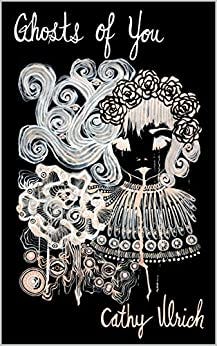Interview with Cathy Ulrich - 2021
Interview #4 (fiction, flash fiction, literary fiction)
Cathy Ulrich is the founding editor of Milk Candy Review, a journal of flash fiction. Her work has been published in various journals, including Black Warrior Review, Passages North, and Wigleaf and can be found in Best Microfiction 2019, 2020 and 2021; Best Small Fictions 2019; and Wigleaf‘s Top 50 Very Short Fictions 2017 and 2019. She lives in Montana with her daughter and various small animals.
Randal Eldon Greene: Hello, Cathy Ulrich
You and I have been "bumping" into each other online for quite some time now as we've published our stories. Eventually we ended up following one another on Twitter, which is just great for me because I'm always being informed when a new Cathy Ulrich work is out in the world to read. Like me, you've published a lot of flash fiction. In fact, you founded Milk Candy Review, which exclusively publishes flash fiction. What draws you to this terse form of fiction?
Cathy Ulrich: Hi, Randal.
The other day, a friend of mine and I were discussing dreams, and how they seem so much longer than they really are because your brain creates an entire universe for you to inhabit in the space of a few minutes. Isn't that so cool?
Flash fiction is like that, for me: building universes in the tiniest moments. I love how spare and thoughtful it must be to be effective. I love how it asks the reader to fall into this universe, how it asks the reader to believe. And doing that in the space of a heartbeat? That's like magic.
Randal Eldon Greene: I actually read many years ago about how the brain is constantly dreaming, even when we're awake. This is why as you're drifting off to sleep, sometimes you'll find yourself suddenly in a dream that seems to be in medias res, somehow already in the middle of the action. Not only are dreams like the microcosm of condensed fiction, there's probably a lot of material we draw from the dreaming realm while we are wide awake, scribbling away at our manuscripts. Where do you get the material for your diverse and sometimes surreal fiction?
Cathy Ulrich: This is always such a hard question to answer—there's material everywhere. In what I read, what I see, what I hear. Sometimes these things become a story, sometimes they don't. Once, when I was driving my daughter to her piano lesson, I saw the silhouette of a person standing alongside the road, but they looked wrong, like an ostrich. So I said to my daughter, "I need to write a story about fighting an ostrich." Her reaction was basically, "You don't need to say everything that pops into your head, you know," but also "Good luck."
Later, because I'd seen a person and thought it was an ostrich, I wrote "Wobble of Ostriches," which appeared in Blue Fifth Review.
So I guess what I'm saying is a lot of my material comes from bad eyesight and a weird brain!

Randal Eldon Greene: If only all our stories could come from bad eyesight and misinterpretation. I'm guessing your collection, Ghosts of You, has a much darker origin.
Cathy Ulrich: You're right about that—the Murdered Ladies series was definitely inspired by how dead women in fiction are treated as something to "set the plot in motion" rather than as actual people. Even in real life, there is a tendency to focus on the murder itself and not the victim. So these stories come from a place of "these are real people, they had hopes, they had dreams and now they are gone."
Randal Eldon Greene: I see. So this is why all the stories in Ghosts of You have the same format: "The thing about being the murdered [female] is you set the plot in motion," substituting "female" for politician, mother, mermaid, etc. While the victims may set the plot in motion, these stories are not about the plot, but are character studies as you say. Though you give us more characters than the dead. You also give us a sense of those around the murdered women. Sometimes we end up knowing the survivors better than the dead at the end of these tales. I'm wondering if you've ever been the survivor, or the survivor's aunt, neighbor, friend?
Cathy Ulrich: Yes, I know (knew?) three murder victims personally: My uncle, an ex-boyfriend, and a girl I worked with who was just killed this last summer. As hard as it is to lose someone, it's so much worse when someone took them away from you on purpose. It's utterly devastating, one of the worst feelings. I wouldn't wish it on anyone.
Randal Eldon Greene: I'm so sorry to hear that. There's not much comfort to be had in this book. But there is a lesson in Ghosts of You; it being to remember to pause when we hear about untimely death. Pause and reflect that this person isn't a news bulletin, but a person like you or me. And the survivors are also like you and me. I think this age of mass media consumption has made us more aware of personal tragedy but has been really tough on sympathy. Would you agree?
Cathy Ulrich: I think tragedy is so much more accessible now—you can hear about almost anything, anywhere, at any time. And of course you can't expect people to have an emotional reaction to every tragedy! That would be exhausting and heartbreaking. But treating tragedy as entertainment, that's something else entirely. I think there has been a tendency to do that in some form or another, especially lately, and it's something I can't understand.
Randal Eldon Greene: I've personally been trying to unplug a bit from the radio, which is where I've gotten most of my news for the past decade and a half. I think the combined stressors of the pandemic and tragic consequence of rhetoric (and lies and lies and lies) that led to the first truly non-peaceful transfer of power here in the US – well, it all started to impact my art in the days after January 6th. Right now, I hardly want to be informed, let alone be entertainingly distracted by tragedy-filled media. How've you been holding up during this weird, weird time?
Cathy Ulrich: It's been hard. I'm surrounded by death all the time. I'm very tired. But who isn't, you know?
Randal Eldon Greene: Yes, we're all in this together. Tired, worn, and surrounded by circumstance. These facts remind me of your story in The Magnolia Review, "The Children, Waiting for Someone to Fall." In that story, a hoard of tragedies (all of which are animal related) that have befallen the children of this school is recounted as a group of coyotes congregates underneath the kids who are hanging onto the monkey bars for dear life. It's a horrific meditation on the – I want to say nihilistic, but perhaps the word I'm searching for here is antagonistic – world.
"The Children" seems like a great companion piece to Donald Barthelme's "The School" (Sixty Stories; Penguin Classics, 2003). One of the interesting contrasts is that in Barthelme's story, the children end up searching for meaning and value in life, whereas in yours they seem to accept the inevitability of horror and death without attempting to find purpose in it all. Would you say you find the world nihilistic, antagonistic? And if not, how do you square this with what you write?
Cathy Ulrich: Right now, I'm having a hard time not considering the world nihilistic and antagonistic. We've just suffered another two mass shootings (and who knows how many more we'll go through by the time this interview gets published?), and the people who have the power to change things are unwilling to change things. It's heartbreaking. It's horrible.
So my writing—yes. I want this world to be better. I want people to be better. In my writing, I try to never focus on the killer or killers, always the victims. It's their lives that matter, their stories.
And the children in Barthelme's "The School," well—how many active shooter drills were schoolchildren going through when that was written? I think he and his characters would see the world very, very differently than I do. I think they have that luxury.
Randal Eldon Greene: I do find it interesting how characters from stories and books can sometimes feel so time-bound and, yet, there's a timelessness in most classic literature that I think inspires in us a shared humanity, a commonality in experiencing life on this planet. What do you think about the idea of timeless classics, and do you have any favorites?
Cathy Ulrich: If I had to pick favorites that might be considered "timeless classics," I would probably say Emily Brontë's Wuthering Heights – the emotions and the characters in that story always feel so real and vital to me – and Kazuo Koike and Goseki Kojima's Lone Wolf and Cub. At the end, when Ogami Itto says to Daigoro: "In that world of rebirth, I'm still your father. In that world and all worlds, you are my son! We are father and child. Forever!" It's such a powerful, heartbreaking moment.
That said, I'm not sure that any literature is truly timeless—there is just work that connects to certain readers no matter what.
Randal Eldon Greene: It's true, sometimes a book just sticks to you regardless of whether or not it's a classic, old or new. The Mantle of Elijah by Israel Zangwill and the Byzantine epic Digenes Akritas both connect with me in ways that are hard to describe. When you publish work for Milk Candy Review, do you publish work that connects with you or is there another set of criteria you use to determine if a work belongs in MCR?
Cathy Ulrich: Oh, definitely it is work that connects with me! But there's also a little something extra I look for in Milk Candy stories—I like a spark of hope and light in each one. It doesn't have to be overt or obvious, but there has to be something there that gives me that feeling of brightness. I want for Milk Candy's stories to offer that light to our readers.
Randal Eldon Greene: Would you mind sharing a link to one of the stories in Milk Candy that has really stood out for you as an example of that brightness?
Then maybe tell us about how and why it moved you.
Cathy Ulrich: Oh, gosh, I could never pick just one story at Milk Candy that stands out. Every story we have published is a story I love and admire. There's beauty and light in every one of Milk Candy's stories, and I'm so grateful to our contributors for sharing them with me!
Randal Eldon Greene: That's fair!
Regarding your own work, I personally cannot wait to get my hands on another Cathy Ulrich book. Are you assembling any new collections for us or is a new bounded book simply not cohering together from what you've been writing and publishing?
Cathy Ulrich: That is so kind of you to say! Thank you so much! I've been working on putting things together, but I'm finding myself easily distracted nowadays, so I haven't gotten anything completely organized. But hopefully I will get my brain in gear and get something out there soon!
Randal Eldon Greene: Distraction is one of the BIGGEST problems we writers face today. I think distraction has always been a bane to creativity, but it's even easier nowadays to find something else wildly and/or mindlessly entertaining to engage our attention. How are you fighting distraction and getting the work of writing done?
Cathy Ulrich: Well, I've had a lot going on in my life, workwise, healthwise, kidwise and otherwise, so I have a lot of distractions right now. And the truth is, I haven't felt much like writing, so I just haven't. I don't want writing to become something I have to force myself to do. So I guess the answer is: I am not fighting distraction and getting writing done! And right now, that's okay. I've written a couple of things here and there, but it's been things I wanted to write and enjoyed the process of the creation.
Randal Eldon Greene: Cathy, it's been a wonderful conversation. And I don't wish to distract you any longer from work, health, kids, and creativity. Thank you so much for your time and the great talk.
Cathy Ulrich: Thank you so much for taking the time to chat with me! I really appreciate it.
Purchase Ghosts of You on Amazon.
© 2021
About the interviewer:
Randal Eldon Greene is the author of Descriptions of Heaven, a novella about a linguist, a lake monster, and the looming shadow of death. His typos are tweeted @AuthorGreene and his website is AuthorGreene.com




